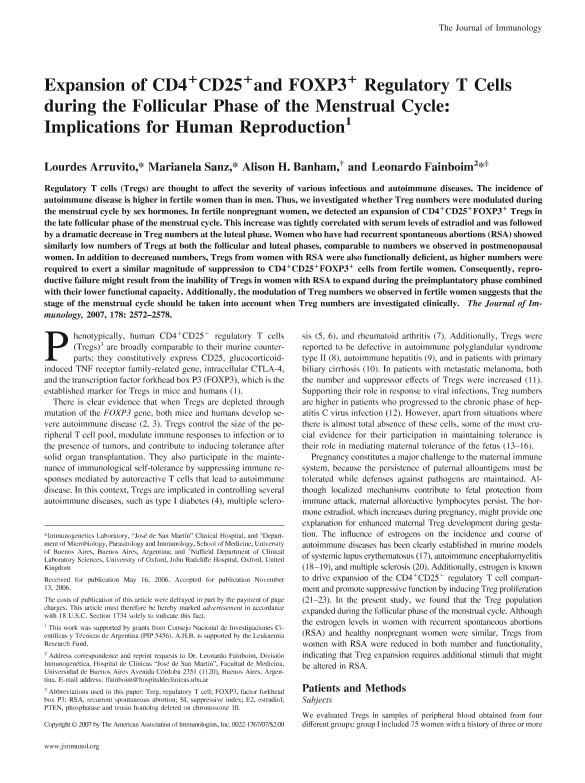Mostrar el registro sencillo del ítem
dc.contributor.author
Arruvito, Maria Lourdes

dc.contributor.author
Sanz, Marianela
dc.contributor.author
Banham, Alison H.
dc.contributor.author
Fainboim, Leonardo

dc.date.available
2020-10-15T17:58:54Z
dc.date.issued
2007-02
dc.identifier.citation
Arruvito, Maria Lourdes; Sanz, Marianela; Banham, Alison H.; Fainboim, Leonardo; Expansion of CD4+CD25+and FOXP3+ regulatory T cells during the follicular phase of the menstrual cycle: implications in human reproduction; American Association of Immunologists; Journal of Immunology; 178; 4; 2-2007; 2572-2578
dc.identifier.issn
0022-1767
dc.identifier.uri
http://hdl.handle.net/11336/115989
dc.description.abstract
Regulatory T cells (Tregs) are thought to affect the severity of various infectious and autoimmune diseases. The incidence of autoimmune disease is higher in fertile women than in men. Thus, we investigated whether Treg numbers were modulated during the menstrual cycle by sex hormones. In fertile nonpregnant women, we detected an expansion of CD4 CD25 FOXP3 Tregs in the late follicular phase of the menstrual cycle. This increase was tightly correlated with serum levels of estradiol and was followed by a dramatic decrease in Treg numbers at the luteal phase. Women who have had recurrent spontaneous abortions (RSA) showed similarly low numbers of Tregs at both the follicular and luteal phases, comparable to numbers we observed in postmenopausal women. In addition to decreased numbers, Tregs from women with RSA were also functionally deficient, as higher numbers were required to exert a similar magnitude of suppression to CD4 CD25 FOXP3 cells from fertile women. Consequently, reproductive failure might result from the inability of Tregs in women with RSA to expand during the preimplantatory phase combined with their lower functional capacity. Additionally, the modulation of Treg numbers we observed in fertile women suggests that the stage of the menstrual cycle should be taken into account when Treg numbers are investigated clinically. The Journal of Immunology, 2007, 178: 2572–2578.
dc.format
application/pdf
dc.language.iso
eng
dc.publisher
American Association of Immunologists

dc.rights
info:eu-repo/semantics/openAccess
dc.rights.uri
https://creativecommons.org/licenses/by-nc-sa/2.5/ar/
dc.subject
FOXP3
dc.subject
REGULATORY T CELLS
dc.subject.classification
Inmunología

dc.subject.classification
Medicina Básica

dc.subject.classification
CIENCIAS MÉDICAS Y DE LA SALUD

dc.title
Expansion of CD4+CD25+and FOXP3+ regulatory T cells during the follicular phase of the menstrual cycle: implications in human reproduction
dc.type
info:eu-repo/semantics/article
dc.type
info:ar-repo/semantics/artículo
dc.type
info:eu-repo/semantics/publishedVersion
dc.date.updated
2020-10-14T21:24:51Z
dc.journal.volume
178
dc.journal.number
4
dc.journal.pagination
2572-2578
dc.journal.pais
Estados Unidos

dc.description.fil
Fil: Arruvito, Maria Lourdes. Universidad de Buenos Aires. Facultad de Medicina. Hospital de Clínicas General San Martín; Argentina. Consejo Nacional de Investigaciones Científicas y Técnicas; Argentina
dc.description.fil
Fil: Sanz, Marianela. Universidad de Buenos Aires. Facultad de Medicina. Hospital de Clínicas General San Martín; Argentina
dc.description.fil
Fil: Banham, Alison H.. University of Oxford; Reino Unido
dc.description.fil
Fil: Fainboim, Leonardo. Consejo Nacional de Investigaciones Científicas y Técnicas. Oficina de Coordinación Administrativa Houssay. Instituto de Inmunología, Genética y Metabolismo. Universidad de Buenos Aires. Facultad de Medicina. Instituto de Inmunología, Genética y Metabolismo; Argentina. Universidad de Buenos Aires. Facultad de Medicina. Hospital de Clínicas General San Martín; Argentina
dc.journal.title
Journal of Immunology

dc.relation.alternativeid
info:eu-repo/semantics/altIdentifier/url/https://www.jimmunol.org/content/178/4/2572.long
dc.relation.alternativeid
info:eu-repo/semantics/altIdentifier/doi/http://dx.doi.org/10.4049/jimmunol.178.4.2572
Archivos asociados
